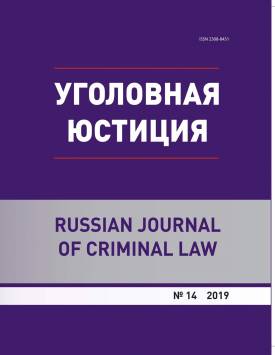Disclosure of Evidence as Possibility to Abuse Discretionary Powers by Courts
The article focuses on the legal capabilities of participants in criminal proceedings and the powers of judges in resolving the issue of evidence disclosure. The disclosure of evidence of a witness, a victim, and a defendant is an exception to the principle of immediacy, so its incorrect application risks a violation of the rights and legitimate interests of participants in the process, as well as the adoption of an illegal and unreasonable decision on the case. The author argues that in some cases the disclosure of evidence is a way of abuse of discretion by the court. In this regard, the following tasks are solved: 1) definition of the evidence disclosure institution; 2) definition of the court discretionary powers; 3) determination of abuse of discretionary powers as a separate type of behaviour; 4) identification of cases of discretionary power abuse by courts in evidence disclosure; 5) definition of criteria for the legitimate and reasonable disclosure of evidence of absent participant in a process. The research employs general and specific scholarly methods of cognition: dialectical, formal logical, comparative legal, systemic, analysis and synthesis. The author analyses the procedure for evidence disclosure in case of absent participants in the process, as enshrined in the current criminal procedure legislation and indicates various positions regarding the need to disclose evidence. The disclosure of evidence can help resolve conflicts. However, this procedure contradicts the principles of adversarial and equal rights of the parties. The study of ECHR resolutions and decisions of Russian courts has revealed a number of cases when the courts incorrectly and insufficiently established the necessity of applying the disclosure of evidence. As a result, the operation of the court can be regarded as an abuse of discretionary powers, which led to an illegal sentence and violation of the rights of participants in criminal proceedings. The author defines the concept and signs of abuse of discretionary powers by courts when the evidence of absent participants is disclosed. The legality and validity of evidence disclosure can be guaranteed through determining reliable grounds for evidence disclosure; taking measures to call absent participants in the criminal process to court; ensuring the implementation of other legal possibilities for examining evidence and challenging the testimony.
Keywords
уголовное судопроизводство, участники уголовного процесса, оглашение показаний, злоупотребление дискреционными полномочиями, criminal proceedings, participants in criminal proceedings, disclosure of evidence, abuse of discretionary powersAuthors
| Name | Organization | |
| Zheleva Olga V. | Tomsk State University | zheleva.olga@gmail.com |
References

Disclosure of Evidence as Possibility to Abuse Discretionary Powers by Courts | Ugolovnaya yustitsiya – Russian Journal of Criminal Law. 2019. № 14. DOI: 10.17223/23088451/14/10
